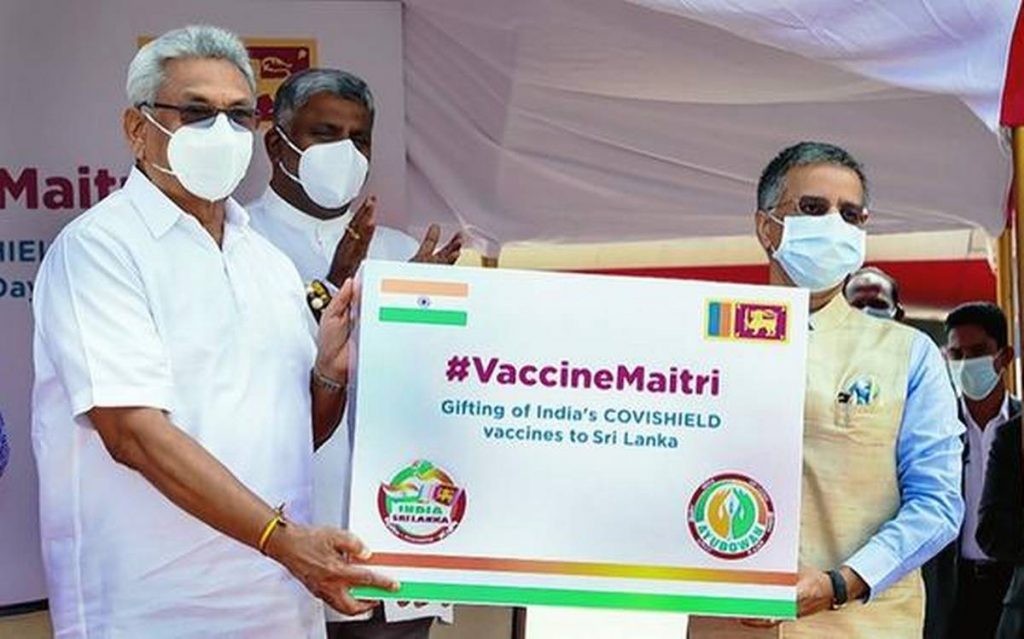- As of January 2022, India had exported about 140 million doses of the Covid-19 vaccine.
- India has also taken up the issue of suspending Intellectual Property Rights (IPR) to ensure countries can manufacture the required vaccines.
- With robust vaccine manufacturing, India is helping the low- and middle-income countries vaccinate their population.
- While developed countries are turning isolationist and practising vaccine nationalism, India is taking the lead in ensuring equitable vaccine distribution and helping other countries.
- India is also hoping to counter the Chinese influence in the South Asian region with vaccine diplomacy.

The COVID-19 pandemic derailed the world and shook states, testing their health and administrative infrastructure. States were put to a rigorous test and it caused massive economic and social disturbances to people’s lives and livelihood. Countries struggled to contain the virus and save lives. The Vaccines came as a saving grace to the struggling global system but vaccine equity was a global challenge amid the pandemic. India’s homegrown vaccine Covishield and Covaxin came at a crucial time while the country was battling growing cases. India launched the Vaccine Maitri initiative to supply the world with affordable vaccines. India has a longstanding history of humanitarian assistance and the vaccine Maitri program is one example. From being the first-responder to disasters in the South Asian regions to contributing troops to UN peacekeeping missions, India is at the forefront of offering assistance to its neighbours and the international community.
The vaccine Maitri initiative is a combination of gifting and order-based delivery of vaccines to India’s neighbours and other low-income countries. India is considered the pharmaceutical hub of the world with the ability for large scale manufacturing and pharmaceutical products which adhere to the global quality standards. India manufactures 60 percent of the global vaccine supply. India’s manufacturing ability combined with the country’s history of humanitarian assistance is supplying vaccines to the low-income countries to help fight the pandemic. While vaccinating its populations (about 1.3 billion people) conducting the largest vaccination drive in the world, India also helped other countries vaccinate its frontline workers and medical professionals.
According to the data provided by the Ministry of External Affairs (MEA), as of January 2022, India had exported about 140 million doses of the Covid-19 vaccine. These exports include grants, commercial dispatch and donations to the COVAX and GAVI alliances. The countries that received Indian vaccines include Bangladesh, Maldives, Nepal, Sri Lanka, Myanmar, Bhutan, Mauritius, Seychelles, and several others. India has also contributed to the COVAX and GAVI vaccine alliances that work towards global vaccine equity. India donated 0.2 million doses to vaccinate UN peacekeepers. India is committed to provide vaccines and ensuring equitable vaccine distribution for lower income countries.
India has also contributed to the COVAX and GAVI vaccine alliances that work towards global vaccine equity.
India has also taken up the issue of suspending Intellectual Property Rights (IPR) in international forums like the WTO and UN to ensure countries can manufacture the required vaccines. India and South Africa have emphasised on accessibility and affordability of the Covid-19 vaccines as a crucial step in the global recovery. With robust vaccine manufacturing, India is helping the low- and middle-income countries vaccinate their population. WHO chief Doctor Tedros said, “India continues to take decisive action and demonstrate its resolve to end Covid-19 pandemic. As the world’s largest vaccine producer, it’s well placed to do so”.
Developed countries with 15 percent of the world’s population are hoarding more than 50 percent of the global vaccine supply. While developed countries are turning isolationist and practising vaccine nationalism, India is taking the lead in ensuring equitable vaccine distribution and helping other countries. Bhutan’s Prime minister said, “It is of unimaginable value when precious commodities are shared even before meeting your own needs, as opposed to giving out only after you have enough”. India is the first country in the world to provide free vaccines to countries (Bhutan, Nepal, Maldives, and Bangladeshetc) to vaccinate their frontline workers. India had to stop exports during the second wave because the Indian vaccine manufacturers couldn’t import the crucial raw materials required. After all, several developed nations like the US, Canada issued a blanket ban on the export of raw materials.
Developed countries with 15 percent of the world’s population are hoarding more than 50 percent of the global vaccine supply.
India is also hoping to counter the Chinese influence in the South Asian region with vaccine diplomacy. With growing Chinese influence in the neighbourhood countries like Nepal, Bangladesh and Sri Lanka, India is hoping to strengthen ties and reassert itself as the dominant player in South Asia. This comes at a time when both countries are engaged in a border standoff. It is an effective use of the Indian soft power to deepen ties with the neighbourhood of south Asian countries. Vaccine diplomacy is also critical because this comes at a time when India is advocating the concept of ‘Aatmanirbhar Bharat’ or self-reliant India. This may even earn some goodwill to India which is vying for a permanent UNSC membership and set to host the G20 summit in 2023. India has also joined hands with the QUAD to lead the vaccine initiative to supply 1 billion doses to South Asia. India has successfully used vaccine diplomacy to increase cooperation with the South Asian region, prove its global standing, and counter the Chinese influence in the region.
(About the authors: Dr. Karamala Areesh Kumar teaches International Relations and World Politics at P.G and Research Centre, St. Joseph’s College (Autonomous), Bangalore, Karnataka. Lalitha. S is a Research Student at Department of Political Science, St. Joseph’s College (Autonomous), Bangalore, Karnataka.)
